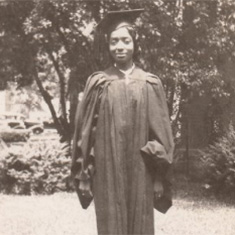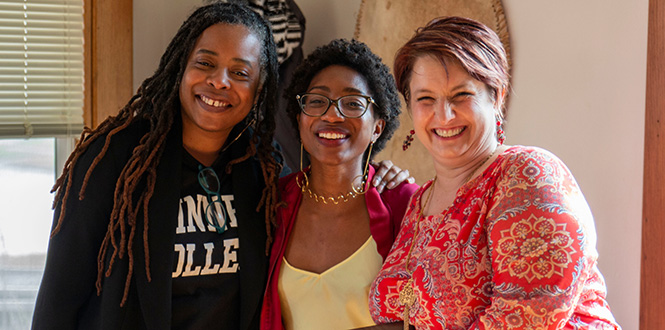Edith Renfrow Smith ’37 Black Women’s Library makes campus debut
May 17, 2019 — By the time New Orleans native Rayyon Robinson ’19 was in junior high, she had three library cards and routinely read books in a single day.
Her teachers brought her books, and after Hurricane Katrina hit and libraries were closed, she dug through her mother and grandmother’s house for more books. She was so intrigued by the power that literature has to influence and change lives that she decided to one day become a librarian.
 Edith Renfrow Smith ’37
Edith Renfrow Smith ’37
was the College’s first black
female graduate.
It’s a goal she’s reached sooner rather than later. Robinson is the founder, curator, and driving force behind Grinnell’s newly opened Edith Renfrow Smith ’37 Black Women’s Library, named after the college’s first black female graduate.
In mid-April, the library, located in a comfortable, art-filled space on the second floor of the Black Cultural Center, had its opening. More than 100 books from black women writers around the globe fill several bookshelves – with space for hundreds more – and an Amazon Wish List put together by Robinson is available for those who want to buy books and donate them to the library.
Though she hasn’t spoken yet to Edith Renfrow Smith, Robinson sent a letter with photos of the opening to Smith, who’s a retired schoolteacher living in Chicago. Smith, who’s 104, is scheduled to attend Monday’s commencement ceremony, where she will receive an honorary Doctor of Humane Letters. That’s when Smith will get a chance to visit the library, which has a plaque and her picture inside.
“I wanted the legacy of black women to have a concrete history – it was important to have a strong name associated with it,” Robinson says. “That’s why we decided to name it after her.”
Robinson, who describes herself as a bookworm now, wasn’t always a reader. “I didn’t like to read until I found a book in fourth grade in the back of my mother’s car,” she admits. “It wasn’t age-appropriate – it had lots of cursing and explicit scenes – but I could relate to it. It wasn’t boring.”
During her third year at Grinnell, she emailed several professors in order to get references for summer library jobs. “I talked about how I wanted to radicalize libraries,” Robinson explains. “There aren’t a lot of collections that specifically target marginalized communities and reflect the historical voices of marginalized people, specifically black people.”
When her advisor, Stephanie Jones, an assistant professor of education, heard about Robinson’s plans, she suggested starting a black women’s library at Grinnell.
 Stephanie Jones, left, an assistant professor of education, Rayyon Robinson ’19, and Maure Smith-Benanti, associate dean of students and director of intercultural affairs, have their photo taken during the library’s opening reception.
Stephanie Jones, left, an assistant professor of education, Rayyon Robinson ’19, and Maure Smith-Benanti, associate dean of students and director of intercultural affairs, have their photo taken during the library’s opening reception.
“That made sense to me,” says Robinson, who was part of the Well Read Black Girls Book Club, a small group of Black women students organized by Jones, who gathered to read and discuss books. “That experience has been extremely gratifying because I found a support system and family at Grinnell. I wanted to re-create that experience with the library and really be intentional about what the mission was, what books would be in it, and whom it was for. It was important to me that black women on campus have a space.”
Jones helped procure funding for the library, which came from the Center for the Humanities, the Gender, Women’s, and Sexuality Studies (GWSS) Program, and the Office of Diversity and Inclusion. Maure Smith-Benanti, associate dean of students and director of intercultural affairs, arranged permission for the library to be located in the cultural center.
The library’s collection, says Jones, exposes students to texts they may never have heard of.
“I wanted myself and other women on campus reflected,” adds Robinson. “Throughout my classes, if it wasn’t specifically addressing race or gender, I wouldn’t read books by black women or even women in general. I wanted to see myself and tell multiple stories from multiple perspectives.”
Robinson plans on earning a master’s degree in library science and creating more community libraries like the Smith one. Her goal is to open a similar library in Algiers, the historic black neighborhood in New Orleans where she grew up and went to elementary school, and where most of her family still lives.
“This project was cool because it was practice to really grow as a librarian and a community organizer,” she says.
— by Anne Stein ’84
For your information:
While books cannot be checked out from the Black Women’s Library, the same books also are being added to the collection at Burling Library and can be checked out from there.
To read more alumni news, check out our news archive.